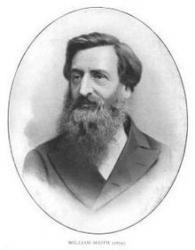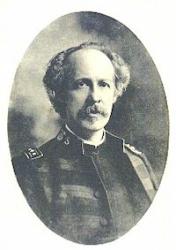Planning worship?
Check out our sister site, ZeteoSearch.org,
for 20+ additional resources related to your search.
- |
User Links
Search Results
Send the Fire
Author: William Booth Appears in 31 hymnals First Line: Thou Christ of burning, cleansing flame
Send the Fire
[O God of burning, cleansing flame, send the fire!]
Appears in 1 hymnal Composer and/or Arranger: Lex Loizides Tune Key: C Major Incipit: 55551 66551 32555 Used With Text: O God of burning, cleansing flame (Send the fire)
[O God of burning, cleansing flame, send the fire!]
[Thou Christ of burning, cleansing flame]
Appears in 1 hymnal Composer and/or Arranger: Jno. R. Sweney Incipit: 13343 32172 23551 Used With Text: Send the Fire
[Thou Christ of burning, cleansing flame]
Thou Christ of Burning, Cleansing Flame
Hymnal: Songs and Music #135 (1922) Languages: English Tune Title: [Thou Christ of burning, cleansing flame]
Thou Christ of Burning, Cleansing Flame
Thou Christ of Burning, Cleansing Flame
Hymnal: The Salvation Army Songs and Music #135 (1917) Languages: English Tune Title: TUCKER
Thou Christ of Burning, Cleansing Flame
Thou Christ of burning, cleansing flame
Author: William Booth (1829-1912) Hymnal: The Song Book of the Salvation Army #203 (1986) Lyrics: 1 Thou Christ of burning, cleansing flame,
Send the fire!
Thy blood-bought gift today we claim,
Send the fire!
Look down and see this waiting host,
Give us the promised Holy Ghost,
We want another Pentecost,
Send the fire!
2 God of Elijah, hear our cry:
Send the fire!
To make us fit to live or die,
Send the fire!
To burn up every trace of sin,
To bring the light and glory in,
The revolution now begin,
Send the fire!
3 ‘Tis fire we want, for fire we plead,
Send the fire!
The fire will meet our every need,
Send the fire!
For strength to ever do the right,
For grace to conquer in the fight,
For power to walk the world in white,
Send the fire!
4 To make our weak hearts strong and brave,
Send the fire!
To live a dying world to save,
Send the fire!
O see us on thy altar lay
Our lives, our all, this very day,
To crown the offering now we pray,
Send the fire!
Topics: The Holy Spirit Person and purpose Languages: English
Thou Christ of burning, cleansing flame
William Booth

1829 - 1912 Author of "Send the Fire" in The Cyber Hymnal Rv William Booth United Kingdom 1829-1912 Born in Sneinton, Nottingham, his father, well-off, lost much of his wealth and descended into poverty when William was young. William was apprenticed to a pawnbroker at age 13 to pay for schooling fees. He was converted at 15 and read extensively and trained himself in writing and speech. He eventually became a Methodist preacher. He did evangelistic work with his friend, Will Sansom, preaching to the poor on Nottingham. He would have stayed with Will, but Sansom got tuberculosis and died in 1849. William spent a year looking in vain for work. He finally found work with a pawnbroker in London, but the small amount of pay from that and preaching was insufficiennt, so he resigned as a lay preacher and turned to open-air evangelism in the streets and on Kennington Common, London. In 1851 he joined the Methodist Reformed Church and became a full-time preacher at their headquarters at Binfield Chapel in Clapham. In 1853 he became Reformers' minister at Spalding, Lincolnshire. He married Catherine Mumford in 1855 in London. Over the years they had eight children. As a reformer minister he found he had to neglect some duties in order to carry on evangelistic campaigns. After three years as pastor at Gateshead, he requested freedom to pursue evangelism, but was refused. He resigned his ministry of the Methodist New Connexion. Soon he was barred from campaigning in Methodist congregations, so he became an independent evangelist. He started a match factory, making boxes of “Salvation Army” matches and paying his workers more than the competition. He founded the Salvation Army in 1865 and became its first General (1878-1912). The Christian movement, with a quasi-military structure and government, spread from London to many parts of the world and is known for being one fo the largest distributors of humanitarian aid. He and his wife opened the Christian Revival Society in London, holding regular evening meetings. It became the East London Christian Mission, in an old warehouse. It was one of 500 charitable groups in London's east end. It began serving food as well as ministry. Over the years the ministry name changed to Salvation Army (SA), but the struggle to minister and serve poor people was ongoing. Eventually, the SA expanded to other countries in the British realm, then to countries outside. During his lifetime, the SA was in 58 countries and colonies, as he traveled extensively and held Salvation meetings. He authored books and published a magazine. He also composed several songs. One book, “In darkest England and the way out” became a best seller after 1890 and set the foundation for SA's modern social welfare approach. He had many antagonists until his late years, when antagonism turned to acceptance, and finally to approbation, when he received honors from English leaders and the monarchy. His funeral, held at London's Olympia, was attended by 40,000, and 150,000 people filed past his casket, World leaders paid him homage.
John Perry
William Booth
John R. Sweney

1837 - 1899 Person Name: Jno. R. Sweney Composer of "[Thou Christ of burning, cleansing flame]" in Songs of Love and Praise No. 2 John R. Sweney (1837-1899) was born in West Chester, Pennsylvania, and exhibited musical abilities at an early age. At nineteen he was studying with a German music teacher, leading a choir and glee club, and performing at children’s entertainments. By twenty-two he was teaching at a school in Dover, Delaware. Soon thereafter, he was put in charge of the band of the Third Delaware Regiment of the Union Army for the duration of the Civil War. After the war, he became Professor of Music at the Pennsylvania Military Academy, and director of Sweney’s Cornet Band. He eventually earned Bachelor and Doctor of Music degrees at the Academy.
Sweney began composing church music in 1871 and became well-known as a leader of large congregations. His appreciators stated “Sweney knows how to make a congregation sing” and “He had great power in arousing multitudes.” He also became director of music for a large Sunday school at the Bethany Presbyterian Church in Philadelphia of which John Wanamaker was superintendent (Wanamaker was the founder of the first major department store in Philadelphia). In addition to his prolific output of hymn melodies and other compositions, Sweney edited or co-edited about sixty song collections, many in collaboration with William J. Kirkpatrick. Sweney died on April 10, 1899, and his memorial was widely attended and included a eulogy by Wanamaker.
Joe Hickerson from "Joe's Jottings #9" used by permission
John R. Sweney
Frederick St. George De Lautour Booth-Tucker

1853 - 1929 Person Name: Frederick Booth-Tucker, 1853-1929 Composer of "TUCKER" in The Cyber Hymnal
Frederick St. George De Lautour Booth-Tucker


 My Starred Hymns
My Starred Hymns


